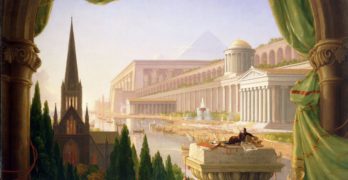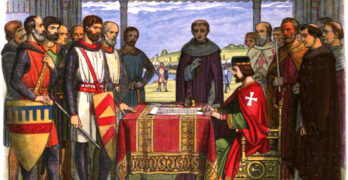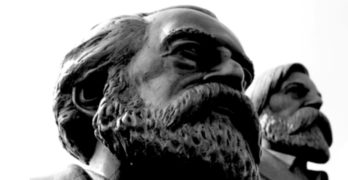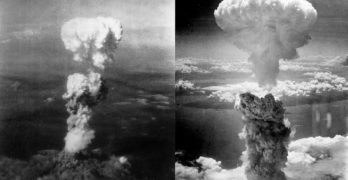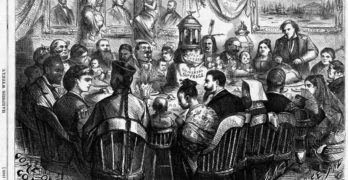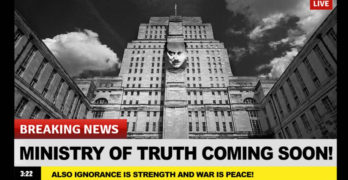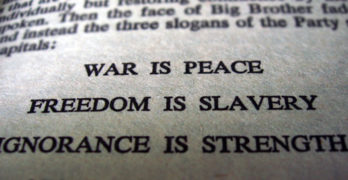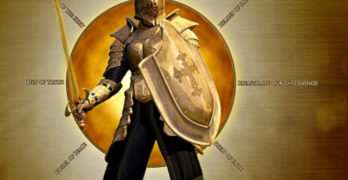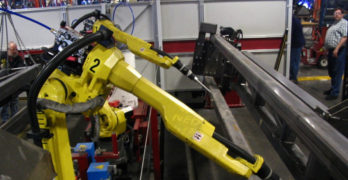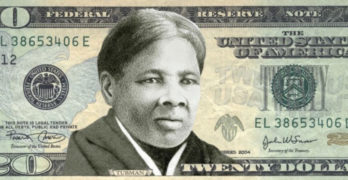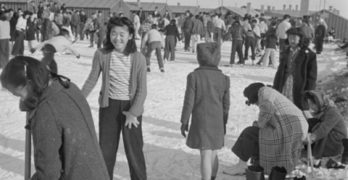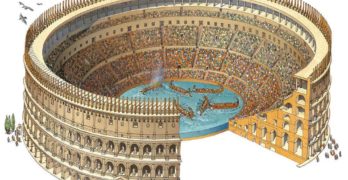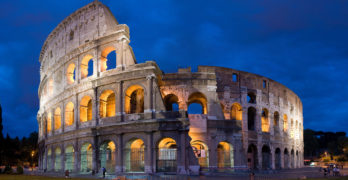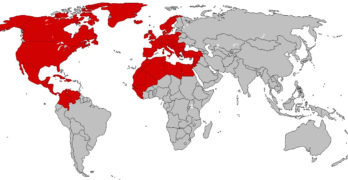 During this weekend, Christians around the world will be celebrating the death and resurrection of Jesus Christ. For the Jews, they will be celebrating Passover, which commemorates Israel’s escape from Egypt when the blood of a lamb was painted on their door frames and saved their firstborn sons from death.
During this weekend, Christians around the world will be celebrating the death and resurrection of Jesus Christ. For the Jews, they will be celebrating Passover, which commemorates Israel’s escape from Egypt when the blood of a lamb was painted on their door frames and saved their firstborn sons from death.
The most striking fact about the Israelites’ crossing of the Red Sea is that it happened on the third day after the Passover lamb was killed.
This event foreshadowed Jesus’ work on the cross. As the spotless Lamb of God, His blood would be spilled in order to save us from the penalty of death brought by sin. At His last supper, Luke records that Jesus revealed Himself as the fulfillment of that event.
Jesus died at 3.00 p.m., the very time when thousands of Passover lambs were being slaughtered. So Christ is called ‘our Passover lamb’, the one who has been sacrificed for us so that the angel of death would pass over those who trust in Him.
He rose from the dead on the third day and his resurrection liberates us from death, just as the Hebrews were liberated from slavery on the third day after the Passover. And you probably know that the Feasts of Passover, Unleavened Bread, and First Fruits dramatically and poignantly foreshadow the crucifixion and resurrection of Jesus.
The good news of Christianity is that God loves us and did not leave us in the mess that we make of our own lives. He came to earth, in the person of His Son Jesus to die instead of us (2 Corinthians 5:21; Galatians 3:13). This is what theologians call the self-substitution of God.
The Lord Chancellor, Lord Mackay of Clasern wrote:
The central theme of our faith is the sacrifice of himself by our Lord Jesus Christ on the cross of our sins…The deeper our appreciation of our need the greater will be our love for the Lord Jesus and, therefore, the more fervent our desire to serve Him.
In the words of the Apostle Peter, “He personally bore our sins in His own body on the tree (as on an altar and offered Himself on it), that we might die (cease to exist) to sin and live to righteousness. By His wounds you have been healed (1 Peter 2:24 AMP).
What is Self-Substitution?
In his book, Miracle on the River Kwai Ernest Gordon tells the true story of a group of POWs working on the Burma Railway during World War II. At the end of each day, the tools were collected from the work party. On one occasion a Japanese guard shouted that a shovel was missing and demanded to know which man had taken it.
He began to rant and rave, working himself up into a paranoid fury and ordered whoever was guilty to step forward. No one moved. “All die! All die! He shrieked, cocking and aiming his rifle at the prisoners. At that moment one man stepped forward and the guard clubbed him to death with his rifle while he stood silently to attention. When they returned to the camp, the tools were counted again and no shovel was missing. That one man had gone forward as a substitute to save others.
In the same way, Jesus came as our substitute. He endured crucifixion for us. Cicero described crucifixion as ‘the most cruel and hideous of tortures’. Jesus was stripped and tied to a whipping post. He was flogged with four of five thongs of leather interwoven with sharp jagged bone and lead.
Eusebuis, the third century church historian, described Roman flogging in these terms: the sufferer’s veins were laid bare, and…..the very muscles, sinews and bowels of the victim were open to exposure’.
He was then taken to the Praetorium where a crown of thorns was thrust onto His head. He was mocked by a battalion of 600 men and hit about the face and head. Jesus was well aware of the shame and public humiliation that He would experience on the cross.
In fact, one of the primary objectives of crucifixion was to shame the person. As the person hung on the cross, spectators walked by, made derogatory remarks, and sometimes even did obscene things which I will not describe.
In a prophetic vision, Isaiah glimpsed the suffering of Jesus seven centuries before they actually took place:
I gave My back to the smiters and My cheeks to those who plucked off the hair; I hid not My face from shame and spitting (Isaiah 50:6).
He was then forced to carry a heavy cross on His bleeding shoulders until he collapsed, and Simon of Cyrene was press-ganged into carrying it for Him.
When they reached the site of the crucifixion, He was again stripped naked. He was laid on the cross, and six-inch nails were driven into His forearms, just above the wrist. His knees were twisted sideways so that the ankles could be nailed between the tibia and the Achilles’ tendon. He was lifted up on the cross which was then dropped into a socket in the ground.
There He was left to hang in intense heat and unbearable thirst, exposed to the ridicule of the crowd. He hang there in unthinkable pain for six hours while His life slowly drained away. When His disciples saw Him die, they learned to despair of themselves and of everything on which they had previously based their hope.
The Deepest Wound
Now we come to the deepest wound of all-rejection. Jesus endured a double rejection: first by men and then by God Himself. Isaiah clearly portrayed the rejection of Jesus by His fellow countrymen:
He was despised and rejected and forsaken by men, a Man of sorrows and pains, and acquainted with grief and sickness; and like One from Whom men hide their faces He was despised, and we did not appreciate His worth or have any esteem for Him ( Isaiah 53:3).
The worst part of His suffering was not the physical trauma or torture and crucifixion or even the emotional pain of being rejected by the world and deserted by His friends, but the spiritual agony of being cut off from His Father for us-as He carried our sins.
He should have been able to live several hours longer on the cross, but He died of a broken heart. John records how one of the soldiers pierced Jesus’ side with a spear, bringing a sudden gush of blood and water. Incidentally, this extraordinary symptom indicates a raptured pericardium, a ‘broken heart’. What broke His heart? The ultimate rejection.
Now from the sixth hour (midday) there was darkness over all the land until the ninth hour (three o’clock in the afternoon). And about the ninth hour (three o’clock) Jesus cried with a loud voice, Eli, Eli, lama sabachthani?—that is, My God, My God, why have You abandoned Me (leaving Me helpless, forsaking and failing Me in My need)? And some of the bystanders, when they heard it, said, This Man is calling for Elijah! And one of them immediately ran and took a sponge, soaked it with vinegar (a sour wine), and put it on a reed (staff), and was about to give it to Him to drink. But the others said, Wait! Let us see whether Elijah will come to save Him from death. And Jesus cried again with a loud voice and gave up His spirit (Matthew 27:45-51 AMP).
This passage gives such a clear picture of the humanity of Jesus as He suffered intense pain and agony. Just think of that awful darkness. Think of the loneliness, the sense of being absolutely abandoned, first by man, then by God. You and I may have experienced some measure of rejection, but never has it been in that measure.
For the first time in the history of the universe, the Son of God prayed but the Father did not answer Him. God averted His eyes from His Son. God stopped His ears at His cry. Why? Because at that time, Jesus was identified with our sin.
The attitude of God the Father toward Jesus had to be the attitude of God’s holiness toward our sin–the refusal of fellowship, a complete and absolute rejection. Jesus did not endure that for His own sake, but instead to make His soul a sin offering for us. And then, look at the consequence, which was so dramatic and so immediate:
And at once the curtain of the sanctuary of the temple was torn in two from top to bottom; the earth shook and the rocks were split (Matthew 27:51).
What does that mean? Simply that the barrier between God and man had been removed. The way was opened for man to come to God without shame, guilt or fear. When Jesus bore our sins and suffered our rejection, He opened the way for our acceptance so that we might gain status as God’s sons and daughters.
Jesus took our rejection so that we might experience His acceptance. That is the meaning of the torn curtain. We now have direct access to God. “For it is through Him that we both whether far off or near now have an introduction (access) by one Holy Spirit to the Father so that we are able to approach Him” (Ephesians 2:18 AMP).
Life’s Purpose is Knowing God
For those who are willing to enter into this type of covenant commitment to God, the reward is great. It is beautifully expressed by the words that Jesus addressed to the Father in John 17:3:
And this is eternal life: it means to know (to perceive, recognize, become acquainted with, and understand) You, the only true and real God, and likewise to know Him, Jesus as the Christ (the Anointed One, the Messiah), Whom You have sent.
Here, indeed, is the ultimate purpose of all life-to know the one true God. Out of this knowledge, there comes eternal life, divine life, the life of God Himself, shared with the believer.
However, knowledge of this kind is not merely theology or doctrine. It is not knowing about God. It is actually knowing God Himself-knowing Him directly and intimately; knowing Him as a Person. It is a person-to-person relationship. It is a spiritual union.
So many of us come from broken or dysfunctional families, we still carry deep wounds from childhood-wounds that resulted from neglect, rejection, or abuse. These experiences make it difficult for us to see God as a loving, warm and intimate Father, and they can be difficult to overcome.
But God says, My precious one, I love you. I do not reject you. I have always loved you. Jesus was wounded for you and me. Your suffering grieves Him deeply. He does not condemn you, but loves you with a profound and everlasting love than you have ever experienced before.
Dr. Karl Barth was one of the most brilliant and complex intellectuals of the twentieth century. He wrote volume after massive volume on the meaning of life and faith. During his lecture tour, theologian Karl Barth visited the University of Chicago in 1962.
After his lecture, during the Q & A time, a student asked Barth if he could summarize his whole life’s work in theology in a sentence. Barth allegedly said:
Yes, I can. In the words of a song I learned at my mother’s knee: ‘Jesus loves me, this I know, for the Bible tells me so.
I agree with Karl Barth. Why then do we often act as if we are trying to earn God’s love? Why do humans have such trouble accepting this love?
Power over Death
We have a Savior who has the power over death. He holds the keys of death and hell. When Christ was down here, He gave us a specimen of what He could do. Before His personal resurrection, He raised three people from the dead, Jairus’ daughter, the widow’s son, and Lazarus of Bethany that we might know that He is the Resurrection and Life.
Whoever believes in Him, although he may die, yet shall he/she live; and whoever continues to live and believes in Him shall never actually die at all (see John 11:25-26). How dark and gloomy this world would be if we had no hope in the resurrection. Paul says:
If there is no resurrection of the dead, then not even Christ has been raised. And if Christ has not been raised, our preaching is useless and so is your faith. More than that, we are then found to be false witnesses about God, for we have testified about God that he raised Christ from the dead. But he did not raise him if in fact the dead are not raised. For if the dead are not raised, then Christ has not been raised either.
And if Christ has not been raised, your faith is futile; you are still in your sins. Then those also who have fallen asleep in Christ are lost. If only for this life we have hope in Christ, we are of all people most to be pitied. But Christ has indeed been raised from the dead, the first fruits of those who have fallen asleep. For since death came through a man, the resurrection of the dead comes also through a man. For as in Adam all die, so in Christ all will be made alive.
Yes, there is a glorious day before us in the future. Such hope never disappoints or deludes or shames us, for God’s love has been poured out in our hearts through the Holy Spirit Who has been given to us. While we were yet in weakness and powerless to help ourselves, at the fitting time Christ died for (in behalf of) the ungodly.
Now it is an extraordinary thing for one to give his life even for an upright man, though perhaps for a noble and lovable and generous benefactor someone might even dare to die. But God shows and clearly proves and demonstrates His own love for us by the fact that while we were still sinners, Christ (the Messiah) died for us (Romans 5:5-8 AMP). Not only does God love the “pure and the holy”, He also loves the ungodly.
We get salvation for the past and peace for the present, but there is glory for the future in store. I cannot convince you enough that God loves you. The truth is, He would not have died for you if He had not loved you.
God sent Jesus to die for the sins of the whole world. If you belong to this world, then you have a part in this love that has been exhibited in the death and resurrection of Jesus Christ
Jesus Christ has provided our salvation through His death on the Cross and resurrection. This cross, with its foolishness (1 Corinthians 1:18) and weakness, its humiliation and shame, is the everlasting sign of the victory that Christ has won by mighty weapons that are spiritual, not carnal (2 Corinthians 10:4).
All we need is to do to respond and accept His undeserved gift of salvation. He said: “I am the way, and the truth, and the life; no-one comes to the Father except through me” (John 14:6). Is your heart so hard that you can brace yourself against His love and spurn and despise it? You can do it, but it will be at your own peril.
Wishing You a Happy Resurrection!







